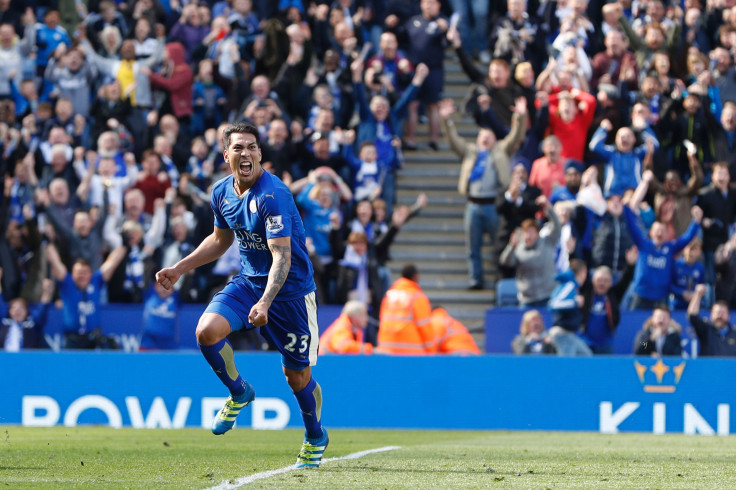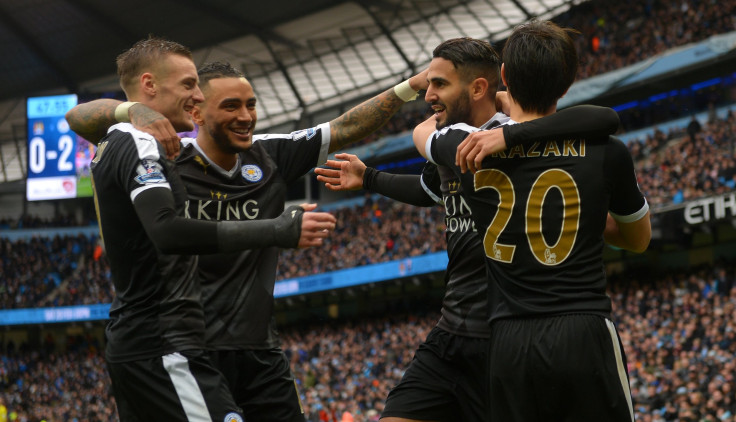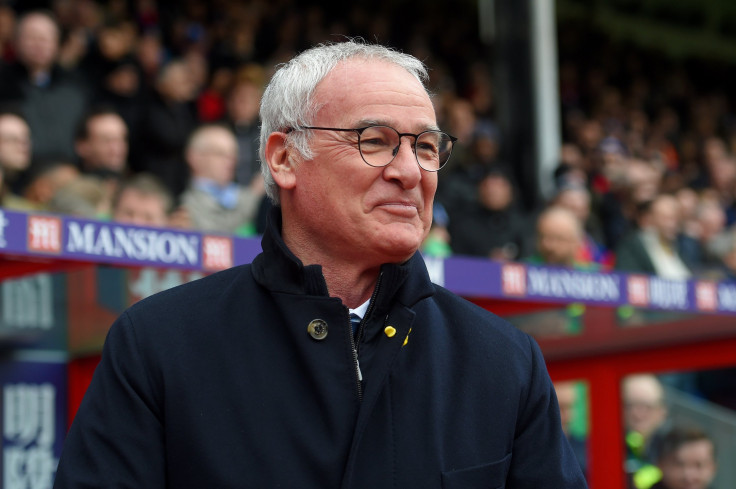Leicester City Upset Premier League’s Financial Order To Close In On Premier League Title

Just 12 years ago, Leicester City, a middling club from England’s East Midlands that had never won a top-division title, were in a financial crisis with debts of £30 million ($46.4 million). Investments from former players and local businessmen were needed just to keep the club afloat. Even after survival was secured, Leicester found themselves down to the third level of the English soccer pyramid in 2008 for the first time in their then-124-year history.
On Sunday, Leicester City could wrap up the Barclays Premier League title.
How Leicester reached this point is one of the most remarkable stories in the history of club sports. As is increasingly the case in Europe's richest league, the investment of a foreign billionaire played a large role. Thai owner Vichai Srivaddhanaprabha, through his King Power duty-free company, wiped off the club’s estimated £103 million debts and has continued to invest ever since. The club is even being investigated for cheating "Financial Fair Play," an initiative that aims to prevent clubs from bankrupting themselves.
But, while it may not quite be the fairytale many want to believe in, Leicester’s story is also no straightforward case of a team being funded to previously unimaginable heights.
One only has to glance through Leicester’s squad list to see that. It is largely an odd-ball collection of those who have either been discarded by elite clubs and those who have never been considered good enough for the very highest level. Of its two stars this season, top-scorer Jamie Vardy was, until the age of 25, operating outside of England’s professional league setup, while the recently crowned Player of the Year, Riyad Mahrez, was signed from a second-tier club in France, Le Havre, for less than £400,000 ($600,000) just over two years ago.

Leicester City’s payroll for this season is estimated at £55 million ($80 million), larger than only three clubs in the 20-team Premier League and around $4 million less than Lionel Messi alone takes home. Compare it to the teams they are currently besting in the table and the difference is stark. Chelsea, the defending champions currently lying down in ninth in the table, have a wage bill of around £200 million. Manchester United, meanwhile, against whom Leicester can clinch the Premier League title with a win on Sunday, top the division’s salaries with £220 million ($322 million).
To put that into context, fifth-placed Manchester United, the most successful club in the history of English soccer, have spent £3.7 million ($5.4 million) for each point they have scored in the Premier League this season. Each point for Leicester, meanwhile, has cost them just £720,000 ($1.1 million).
Even though Mahrez and Vardy have recently signed new contracts that reflect their performances this season rather than their limited reputations before this campaign, Leicester will still be at the lower end of Premier League wage bills.
To some extent, Leicester got here by being smarter than their richer rivals, employing at times a version of "Moneyball." Needing a defensive-minded midfielder last summer after inspirational veteran Esteban Cambiasso departed for a last shot at the Champions League, they studied the statistics and came across N’Golo Kante, then playing at mid-table French side Caen, but who had led Europe’s top divisions in tackles made. Spanish giants Real Madrid had reportedly rejected the opportunity to sign him, because his profile didn’t fit the club’s superstar image, allowing Leicester to pick him up for a modest £5.6 million ($8.2 million).
Kante has been a revelation. Seemingly blessed with endless energy, the 25-year-old embodies the team’s commitment and work rate, and his contributions led him to being one of the six nominees for England’s Player of the Year award. And while the fee for Kante has been the biggest steal of the offseason, the same can almost be said for starting left back Christian Fuchs, who arrived on a free transfer.
The big clubs have figured out that Leicester are onto something, with Arsenal snatching one of the club’s scouts in February.
But it cannot be denied that there is also a freak nature to Leicester’s rise to within three points of clinching the Premier League title. So many players are having the season of their lives, having only ever previously hinted at such potential. For much of last season, with largely the same group of players, Leicester were rooted to the foot of the Premier League, looking fated to be relegated back to the second tier Championship from whence they had just arrived.
Escaping relegation last season was in itself a miracle. Behind seven wins in their last nine matches, Leicester made an unprecedented climb out of the Premier League cellar. Still, nobody believed that such form would be replicated over the duration of the following season.
The manager who guided them to safety, the combative Nigel Pearson was dismissed in the wake of his son being one of three youth-team players to be sacked for their involvement in a racist sex tape on a post-season tour of Thailand. A month later, Vardy was caught up in his own racism storm after a video showed him directing racial epithets to a Japanese patron on a late-night trip to a casino.
The man who replaced Pearson, Claudio Ranieri, was then a 63-year-old Italian who had been seen throughout his career as a serial loser, so often finishing second but never taking home the top prize. His last job had seen him sacked as manager as Greece after a loss to one of the lowliest sides in all of world soccer, the Faroe Islands.

Leicester’s odds to win the Premier League were installed at 5,000/1 by British bookmakers, and even that seemed generous to the Foxes. Many experts, including this one, backed Leicester to be relegated
Even Leicester’s playing style goes against the grain. While the trend in soccer since the emergence of the dominant Barcelona and Spain sides eight years ago has been toward a possession style and one-striker or even striker-less formations. In contrast, Leicester play in a 4-4-2 formation, previously seen as horribly antiquated, and rank 18th in the Premier League in terms of time in possession. Ranieri’s team welcomes opponents having the ball, and in fact are at their most dangerous when that is the case.
While Leicester’s story may never be repeated, there is a trend that could see clubs like Leicester become more regular challengers to the Premier League’s elite. Over the next three years, Premier League clubs will share £8.3 billion ($12.1 billion) from a new broadcast deal that is by far the largest among soccer’s leagues. And, rather than just the rich getting richer, all the clubs in the Premier League stand to benefit substantially. The parity in payouts ensures that even lowly ranked Premier League clubs have incomes in excess of those from some far-more successful European teams.
In the Premier League, the ratio between the top and bottom club in terms of broadcast revenue is just 1.5 to 1, while in Spain’s La Liga it is between 4.5 to 1 and 3.5 to 1, and has been even greater in the past. It means that Leicester, even before the new broadcast deal goes into effect, take in more revenue than the Europa League winners for the last two years, Sevilla, and four-time European champions Ajax, of the Netherlands.
So while the owners of Manchester United and Chelsea will be smiling at the ever-increasing figures on their revenue sheets, they could also find dominance far harder to come by on the pitch. Having provided the story of this sporting season, the Premier League looks set to continue to captivate in the years to come.
© Copyright IBTimes 2024. All rights reserved.





















